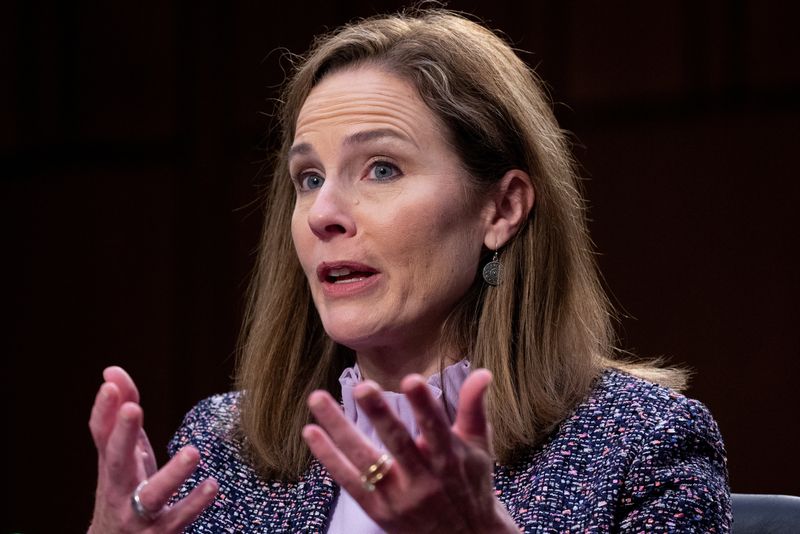US Supreme Court’s Barrett asserts conservative power, but favors narrower approach
2024.07.05 04:47
By Andrew Chung
WASHINGTON (Reuters) – Conservative Justice Amy Coney Barrett in a March public appearance alongside liberal Justice Sonia Sotomayor said that one way to promote compromise on the U.S. Supreme Court is by issuing narrower rulings rather than sweeping ones.
“Not everything has to be decided in an opinion,” Barrett said.
She applied that view on Monday in the court’s landmark ruling that former President Donald Trump has broad immunity from prosecution for official acts taken in office. Barrett voted with her fellow conservatives, but refused to join them in part of the opinion she thought went too far.
The court’s divisions between the six conservative and three liberal justices are obvious. But there also are tensions within the conservative bloc even as it has succeeded in moving American law rightward since Trump appointed Barrett in 2020 to replace the late liberal icon Ruth Bader Ginsburg. Barrett’s arrival gave the conservatives a commanding 6-3 majority.
While Barrett typically votes with her fellow conservatives, she increasingly has asserted her preference for narrower rulings and critiqued their legal approaches, displaying a willingness to pursue a more moderate path.
University of Notre Dame Law School professor Sherif Girgis said the court can decide more – or less – in a case, as it sees fit.
“Justice Barrett seems likelier than others to use that flexibility to decide less, or to leave an issue for later resolution, especially if she thinks that deciding more would require the court to settle a bunch of open questions about how to implement a more sweeping approach,” Girgis said.
Girgis said it appears Barrett “thinks narrower rulings are better for the court’s standing with the public.”
In the immunity ruling, Barrett declined to endorse one of the key conclusions – that in any prosecution of a former president, juries cannot consider evidence touching on official acts – now deemed broadly immune – even in a criminal case based only on private conduct, which is not shielded.
“The Constitution does not require blinding juries,” Barrett wrote, offering the hypothetical situation of a former president being prosecuted for seeking or accepting bribes. Barrett noted that “excluding from trial any mention of the official act connected to the bribe would hamstring the prosecution.”
On this aspect, Barrett aligned with the court’s dissenting liberals – Sotomayor, Elena Kagan and Ketanji Brown Jackson.
Barrett also indicated reservations about the breadth of rulings in two other Trump-related cases.
The justices in March unanimously overturned a decision by Colorado’s top court disqualifying Trump from that state’s Republican presidential primary ballot after it found he had participated in an insurrection by inciting the Jan. 6, 2021, attack on the U.S. Capitol by his supporters.
The court’s majority could have stopped there, but it further decided that the constitutional provision at issue can be enforced only through future legislation passed by Congress. Barrett refused to join that part. Opinions in politically charged cases, Barrett wrote, “should turn the national temperature down, not up.”
Last Friday, Barrett was the only conservative justice to dissent in a ruling that raised the legal bar for prosecuting Jan. 6 rioters, as well as Trump, on charges of corruptly obstructing an official proceeding.
‘OPENLY STRIDENT’
Liberals remain skeptical of Barrett.
“The hope that Justice Barrett will serve as a moderating presence on her more openly strident colleagues will remain illusory until they heed her call or she sides with the liberal justices on (a) case of major national importance,” Devon Ombres of the left-leaning Center for American Progress think tank said.
Barrett is part of the conservative majority that has rolled back abortion rights, widened gun rights, rejected race-conscious university admissions and undercut the power of federal regulatory agencies.
But she generally is considered among the three justices in the court’s ideological middle, alongside John Roberts and Brett Kavanaugh, though all three are unmistakably conservative.
Barrett joined the liberals in dissent when the court blocked a major air pollution regulation. And she authored rulings upholding federal standards giving preferences to Native Americans in adopting Native American children and rejecting limits on contacts between President Joe Biden’s administration and social media platforms. Both rulings found that Republican-led states or conservative plaintiffs lacked the legal standing to sue.

Georgetown University law school professor Mary McCord noted that Barrett asked questions in the obstruction and immunity cases “probing whether there was a middle ground.”
“At least in these cases, as well as others in which she has criticized the way that some members of the court have relied on history and tradition, she seems to want to issue opinions that allow for easier applications of the court’s holding in future cases,” McCord said.








